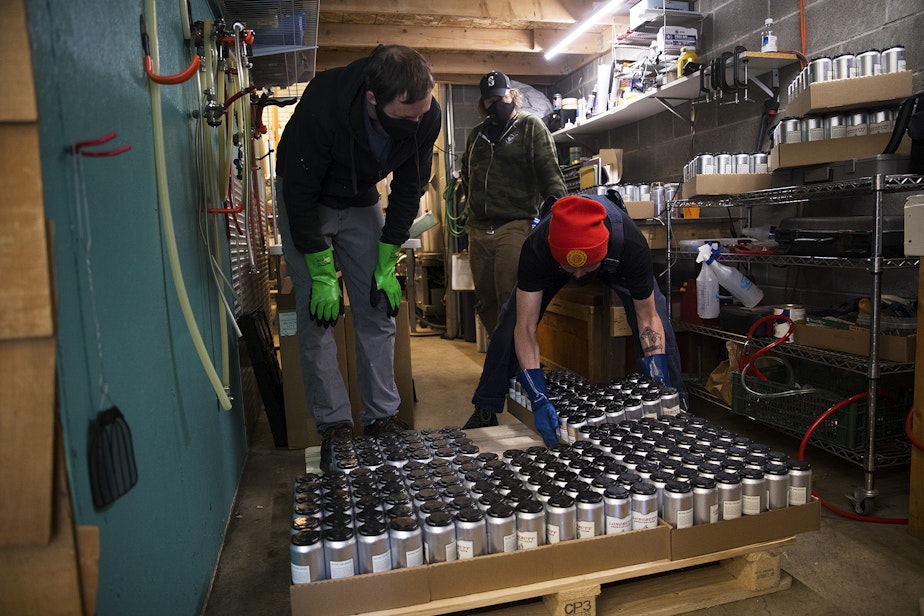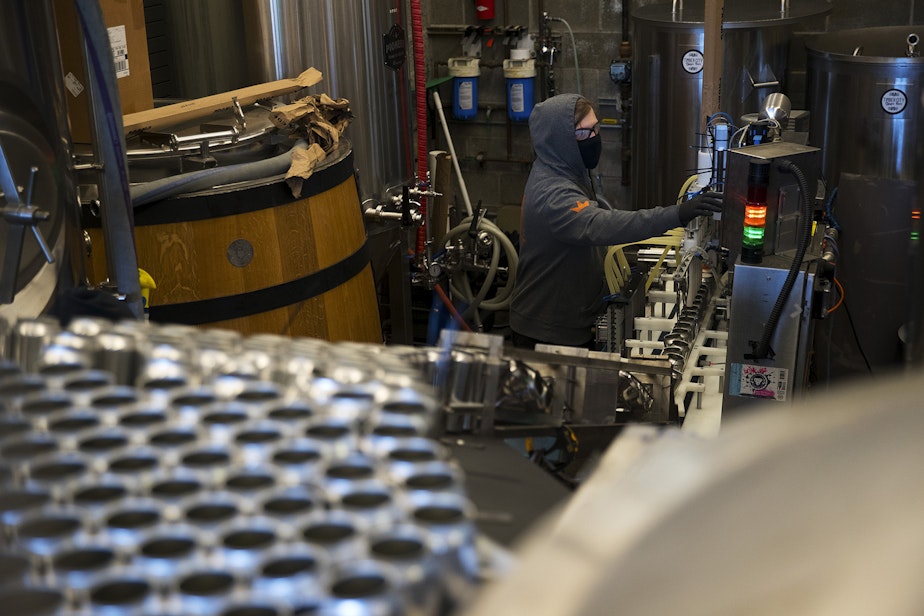While many of us work from home, this Seattle brewer lives at work
The pandemic has forced many businesses to come up with creative ways to stay afloat. One local brewer used the down time during the stay-at-home order to reimagine his business strategy.
When it became clear the state’s shutdown wasn’t going to end anytime soon, John Marti took an unusual step. He moved out of his apartment and into his workplace—with the landlord’s approval. He’s been living in the South Park brewery since.
“It’s not so bad,” said Marti, head brewer and co-owner of Lowercase Brewing.
He moved in here to save money and the business. Marti gives a tour of the 99-square-foot room, right above the boiler. He personalized it with a bookshelf, a white rug and a bunk bed that he built.
“Once I put the rug in, it changed everything.”
The brewery has been quiet. Normally he supplies kegs to restaurants and bars. But now those places are closed, there’s no market for the beer. He and co-owner Chris Smith had to lay off all 12 of their staff. Lowercase Brewing is one of 421 craft breweries around the state struggling to stay afloat.
Sponsored
“Right now they’re treading water,” said Eric Radovich, Executive Director of the Washington Beer Commission.
He says during the pandemic, two breweries have already gone out of business, two new ones have started up. Radovich says this is a critical time for breweries.
“The opportunity to get people back into the tasting room is in the summertime, which we would refer to as beer drinking season, if there is such a thing. But from June through September most of our breweries sell the bulk of their beer during that time frame.”
Sponsored

In the meantime, breweries are finding new ways to get their beer to customers. For the first time, they’re canning it.
At Lowercase Brewing, Marti leads me to the area where a mobile unit is ready to can the beer.
“As it comes off the wheel, they put them into cases and put these packed tags on them to hold them together in four packs and load up the pallet.”
The pallets will then go into the cold room until they’re delivered later on. Canning is new territory for Lowercase, but no matter. Marti’s happy to be making beer again.
Sponsored
“When the ingredients showed up from our supplier, it was just a joy.”
Sponsored
Now that they’re packaging to go, there’s labeling to think about. And adjustments to the brewing process. Making beer for the keg is different from brewing beer that will end up in a can.

“Every time you transfer the beer from one vessel to another it loses a little bit of its life,” Marti explained. “And so you have to kind of build that life up on the front end, knowing it’s going to lose a little bit of life once you put it into the can itself.”
Before becoming head brewer of Lowercase, Marti was a bartender, a sommelier, and a wine buyer. As much as he enjoyed the wine world, his heart was in beer.
Sponsored
“I feel like a blue collar person undercover in the wine world.”
Plus, he likes that beer making is a more collaborative industry.
“There’s been no secrets about the production of beer. Everyone’s so excited to tell about what they learned and share that with other brewers and breweries.”
Even though Marti is back to making beer, production has been limited. But it’s a start. He hopes to eventually hire back his staff.
Marti has been living in the brewery since late March. He appreciates the kindness that people have shown: One customer asked if he needed a space heater, another dropped off chips and guacamole.
Sponsored
“You don’t have to give money to be supportive, you can give thoughts… be creative right now, it doesn’t have to be just money.”
While many of us keep working from home, Marti hopes business will pick up again so he can stop living at work.




